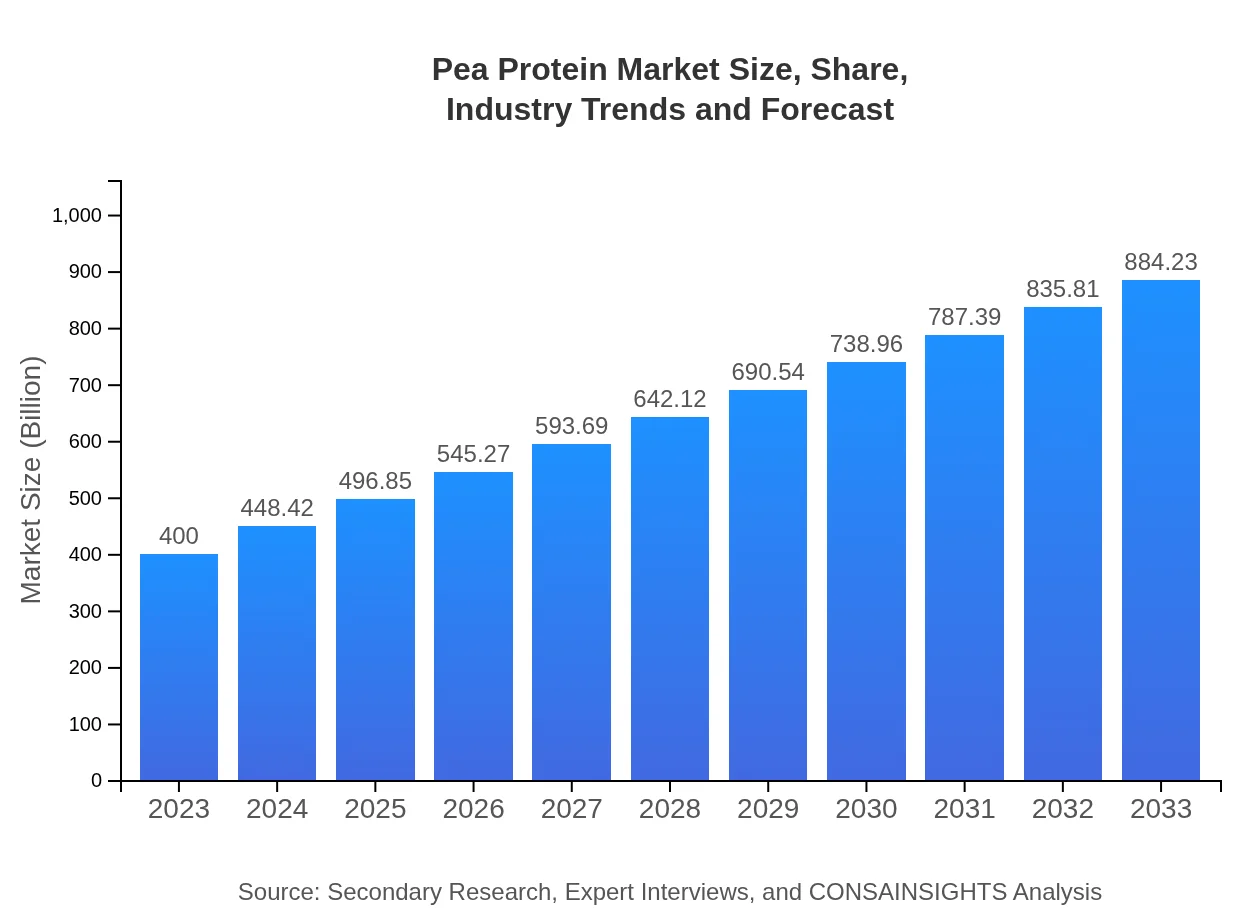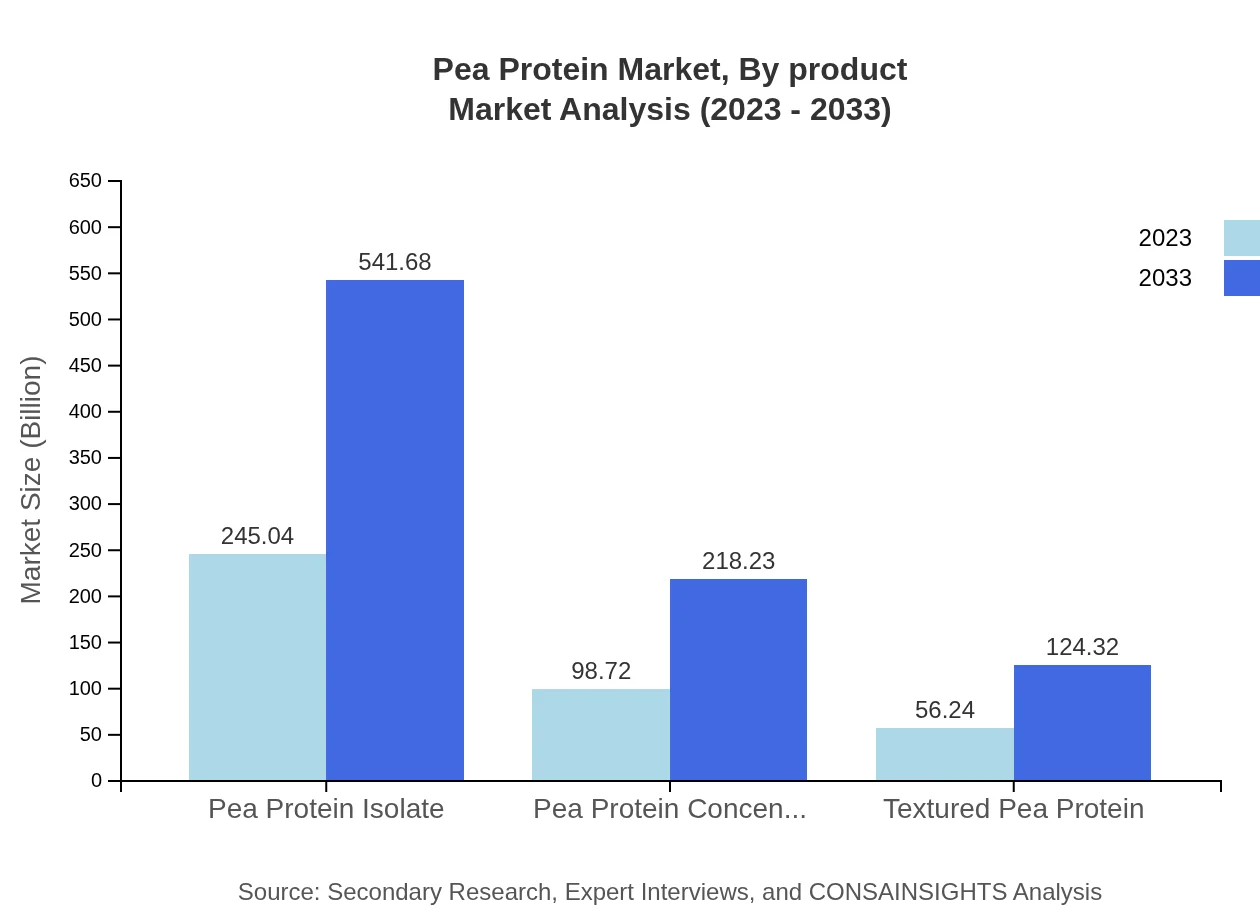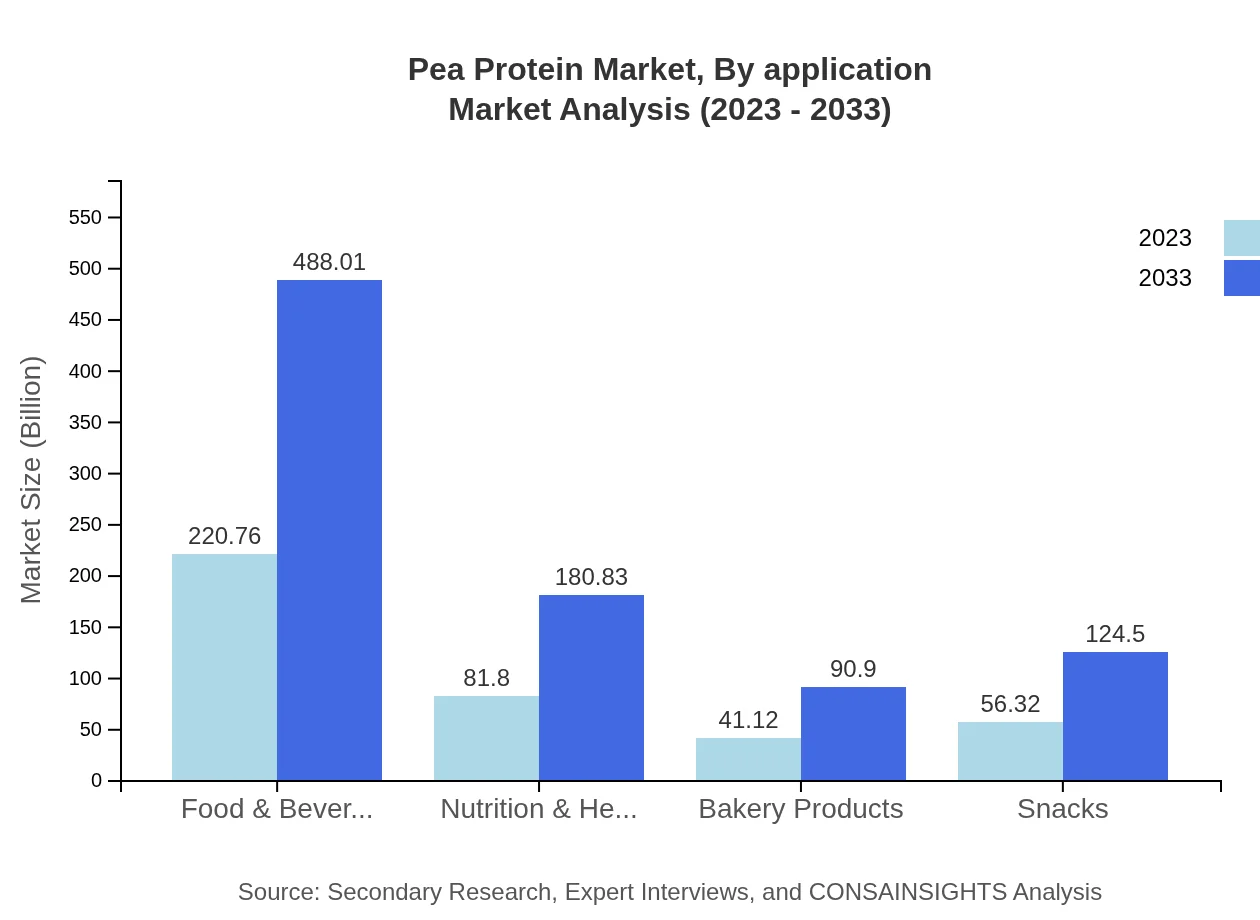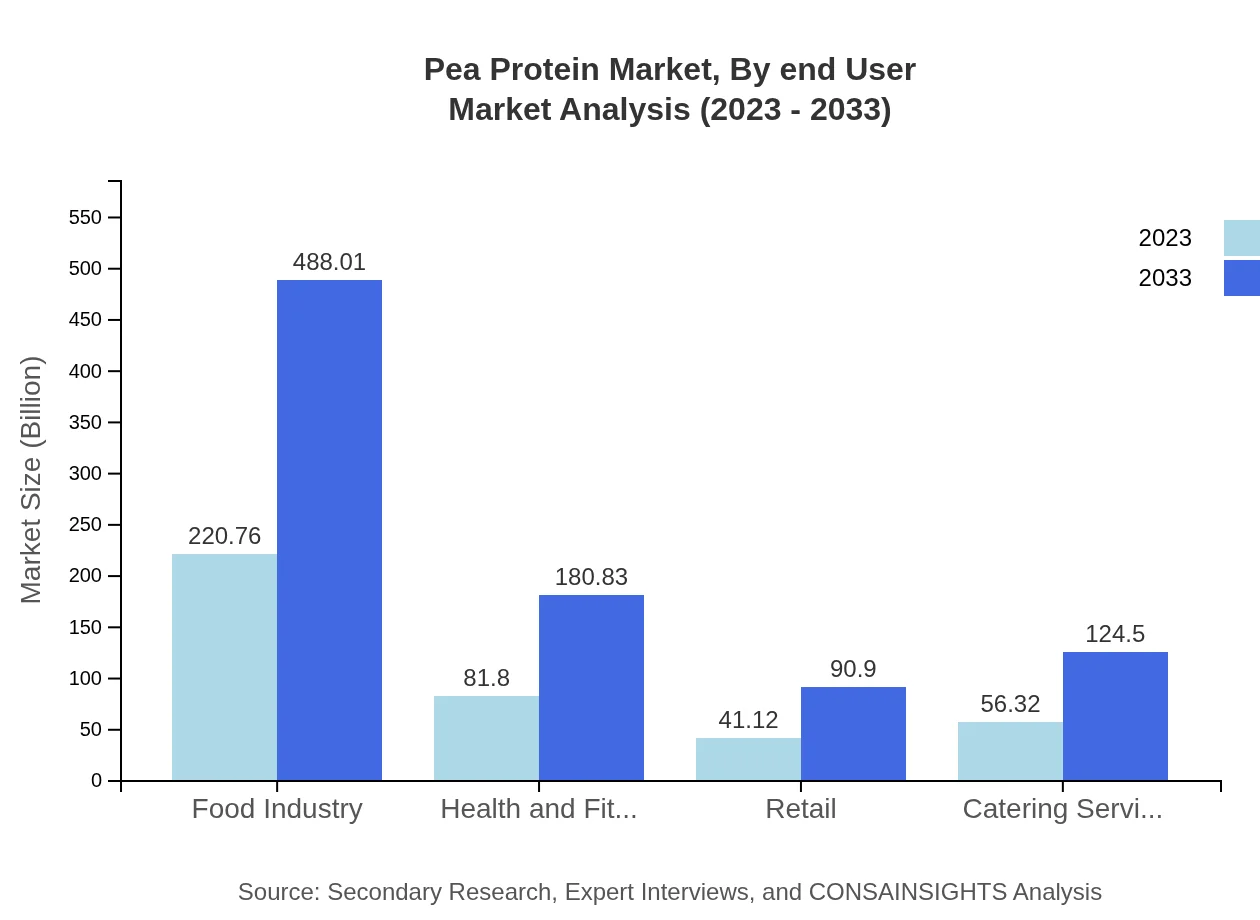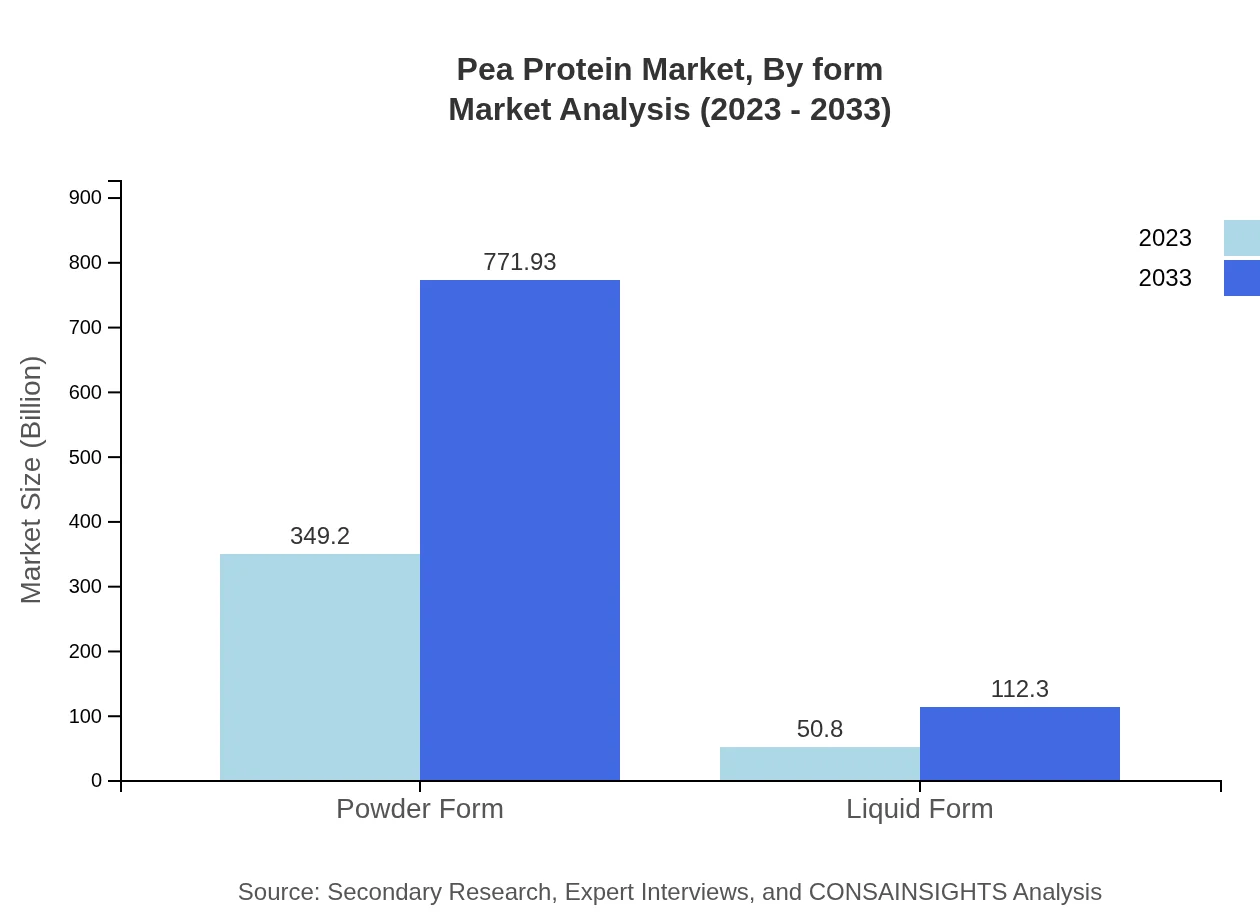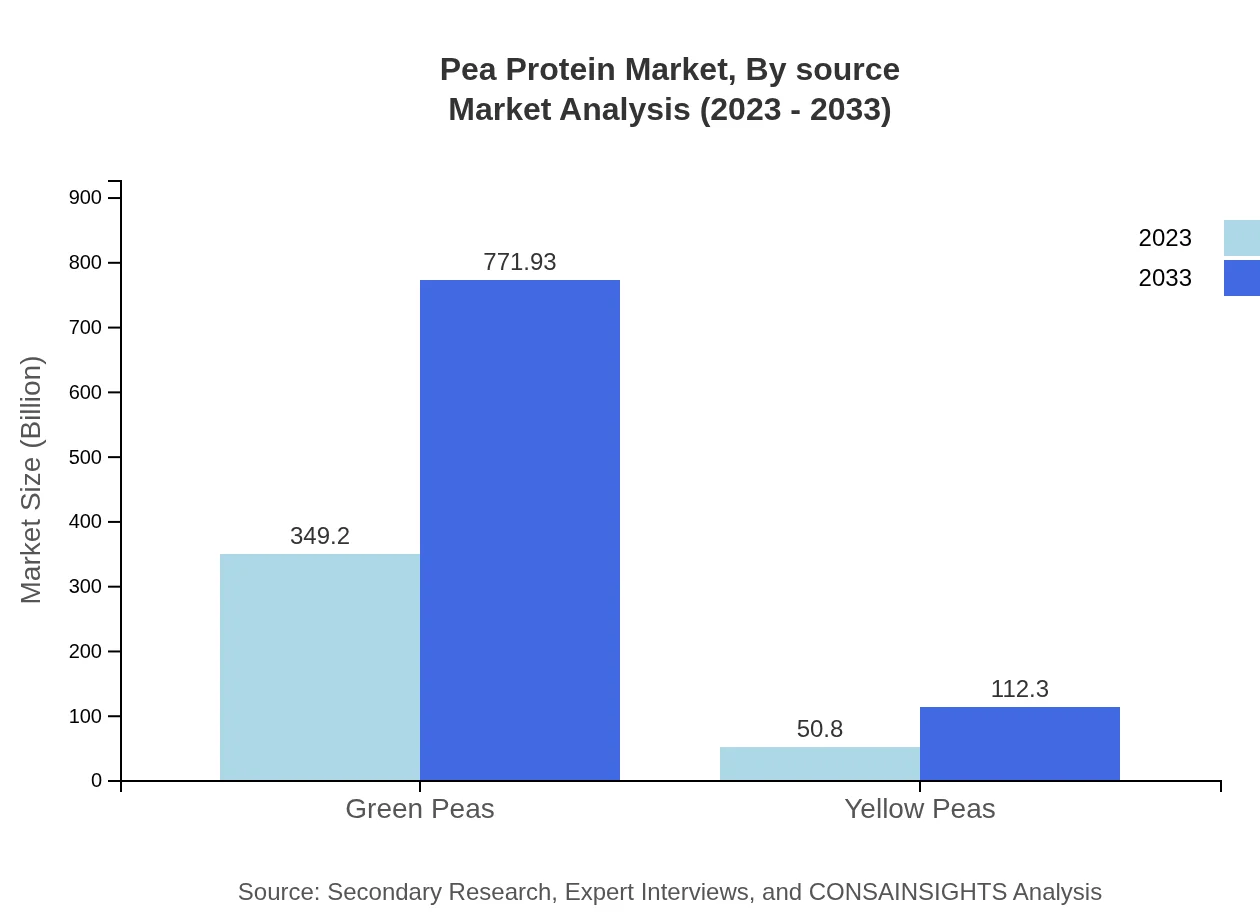Pea Protein Market Report
Published Date: 31 January 2026 | Report Code: pea-protein
Pea Protein Market Size, Share, Industry Trends and Forecast to 2033
This report provides a comprehensive analysis of the pea protein market, covering market size, growth rates, regional insights, and industry dynamics over the forecast period from 2023 to 2033.
| Metric | Value |
|---|---|
| Study Period | 2023 - 2033 |
| 2023 Market Size | $400.00 Million |
| CAGR (2023-2033) | 8% |
| 2033 Market Size | $884.23 Million |
| Top Companies | Beyond Meat, Nutriati, Dupont Nutrition & Biosciences, Pea Protein Co. |
| Last Modified Date | 31 January 2026 |
Pea Protein Market Overview
Customize Pea Protein Market Report market research report
- ✔ Get in-depth analysis of Pea Protein market size, growth, and forecasts.
- ✔ Understand Pea Protein's regional dynamics and industry-specific trends.
- ✔ Identify potential applications, end-user demand, and growth segments in Pea Protein
What is the Market Size & CAGR of Pea Protein market in 2023?
Pea Protein Industry Analysis
Pea Protein Market Segmentation and Scope
Tell us your focus area and get a customized research report.
Pea Protein Market Analysis Report by Region
Europe Pea Protein Market Report:
Europe's pea protein market is projected to grow from USD 117.92 million in 2023 to USD 260.67 million by 2033. The region is characterized by a strong trend towards plant-based diets, driven by sustainability and health factors. Countries like Germany, the UK, and France are witnessing robust growth in demand for meat alternatives and plant-based protein products.Asia Pacific Pea Protein Market Report:
In 2023, the Asia Pacific pea protein market was valued at USD 80.44 million and is projected to grow to USD 177.82 million by 2033. The region has seen rapid growth propelled by increasing health consciousness, rising disposable incomes, and a growing base of vegetarians and vegans. Major markets include China and India, where the demand for plant-based proteins in dairy alternatives and meat substitutes is escalating.North America Pea Protein Market Report:
North America leads the pea protein market with a size of USD 140.52 million in 2023, anticipated to reach USD 310.63 million by 2033. A significant demand for nutritious products among health-conscious consumers, along with the prevalence of vegan diets, fuels market growth. The U.S. remains a dominant player, with many innovative pea protein products entering the market.South America Pea Protein Market Report:
The South American pea protein market was valued at USD 26.00 million in 2023, expected to increase to USD 57.48 million by 2033. Factors such as expansion in health food industries and increased adoption of plant-based diets in Brazil and Argentina are key growth drivers. Additionally, the region benefits from an agricultural focus on pea cultivation, enhancing supply capabilities.Middle East & Africa Pea Protein Market Report:
In the Middle East and Africa, the pea protein market is expected to grow from USD 35.12 million in 2023 to USD 77.64 million by 2033. The rising awareness of health issues and dietary requirements is leading to increased interest in plant-based foods. Growth is supported by investments in plant protein processing and distribution networks.Tell us your focus area and get a customized research report.
Pea Protein Market Analysis By Product
The pea protein market is segmented based on product form into pea protein isolate, concentrate, textured pea protein, and others. The pea protein isolate dominates the market with a market size of USD 245.04 million in 2023 and expected growth to USD 541.68 million by 2033. Pea protein concentrate follows with a market size of USD 98.72 million in 2023, anticipated to rise to USD 218.23 million by 2033. Textured Pea Protein holds a market size of USD 56.24 million in 2023 and projected growth to USD 124.32 million by 2033.
Pea Protein Market Analysis By Application
The application segment of the pea protein market includes food industry, health and fitness, retail, catering services, and more. The food industry takes the lead with market size expected to grow from USD 220.76 million in 2023 to USD 488.01 million by 2033. Health and fitness also showcase significant growth, expanding from USD 81.80 million in 2023 to USD 180.83 million by 2033.
Pea Protein Market Analysis By End User
In terms of end-user industry, the pea protein market serves diverse sectors including food and beverages, nutrition and health, and bakery products. The food & beverages sector shows significant demand, increasing from USD 220.76 million in 2023 to USD 488.01 million by 2033. The nutrition & health sector also projects growth from USD 81.80 million in 2023 to USD 180.83 million by 2033.
Pea Protein Market Analysis By Form
Pea protein is available primarily in two forms: powder and liquid. The powder form dominates the market, being more versatile for various products from snacks to bakery. Its size is projected to grow from USD 349.20 million in 2023 to USD 771.93 million by 2033, while the liquid form is also witnessing growth, expected to go from USD 50.80 million in 2023 to USD 112.30 million by 2033.
Pea Protein Market Analysis By Source
The source segment of pea protein largely revolves around green and yellow peas. Green peas are the leading source with a significant market share, while yellow peas contribute to a growing segment suited for protein-rich food products. The total size of these sources is projected to see substantial growth as consumer preferences shift towards plant-based options.
Pea Protein Market Trends and Future Forecast
Tell us your focus area and get a customized research report.
Global Market Leaders and Top Companies in Pea Protein Industry
Beyond Meat:
A pioneer in plant-based food products, Beyond Meat focuses on producing meat alternatives that provide the texture and flavor of traditional meat. Their innovations in pea protein-based products are expanding consumer options.Nutriati:
Nutriati specializes in plant-based proteins, particularly from chickpeas and peas, offering a range of functional ingredients that cater to health and food manufacturers seeking clean-label ingredients.Dupont Nutrition & Biosciences:
Dupont is a significant player in the field of food ingredients, with a strong emphasis on plant proteins, including pea protein isolates and concentrates, facilitating a diverse range of applications.Pea Protein Co.:
A dedicated supplier of pea protein, Pea Protein Co. focuses on innovative extraction technologies and sustainability, aiming to meet the rising global demand for plant-based protein solutions.We're grateful to work with incredible clients.









FAQs
What is the market size of pea Protein?
The global pea protein market is valued at approximately $400 million in 2023, with a projected CAGR of 8% from 2023 to 2033. By 2033, the market is expected to grow significantly, reflecting rising demand across various sectors.
What are the key market players or companies in this pea Protein industry?
Key players in the pea protein industry include companies like Ingredion, Cargill, and DuPont, among others. These companies dominate through innovation and extensive distribution networks to cater to diverse market needs.
What are the primary factors driving the growth in the pea Protein industry?
The growth in the pea protein industry is primarily driven by increasing health consciousness, the rise of plant-based diets, and demand for high-protein food alternatives. Additionally, the trend towards clean label products enhances market growth.
Which region is the fastest Growing in the pea Protein market?
Asia Pacific is the fastest-growing region in the pea protein market, with a growth forecast from $80.44 million in 2023 to $177.82 million by 2033, driven by rising health awareness and dietary shifts towards plant-based proteins.
Does ConsaInsights provide customized market report data for the pea Protein industry?
Yes, ConsaInsights offers customized market report data tailored to specific needs in the pea protein industry, including detailed insights, forecasts, and strategic recommendations to support business decisions in this sector.
What deliverables can I expect from this pea Protein market research project?
You can expect comprehensive deliverables including market size analysis, segment breakdowns, competitive landscape insights, trends, and forecasts to guide strategic planning and investments within the pea protein market.
What are the market trends of pea Protein?
Current market trends of pea protein include increasing adoption in food and beverage applications, rising interest in sustainable sourcing, and a growing consumer base seeking vegan and allergen-free alternatives, positioning pea protein favorably for future growth.

